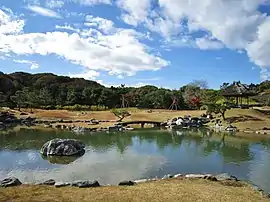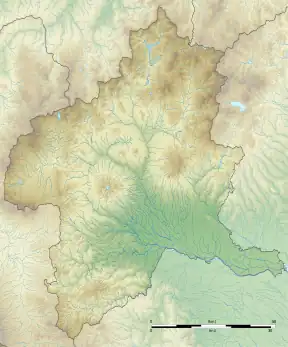| Rakusan-en | |
|---|---|
| 楽山園 | |
 Rakusan-en | |
  | |
| Type | Japanese garden |
| Location | Kanra, Gunma, Japan |
| Coordinates | 36°13′42.3″N 138°54′50.2″E / 36.228417°N 138.913944°E |
| Area | 23,437.33 square meters |
| Created | c.1617 |
| Status | Open |
The Rakusan-en (楽山園, Sakai-shi teien) is a traditional Japanese garden located in the town of Kanra, Gunma Prefecture, Japan. It became a nationally designated Place of Scenic Beauty in 2000.[1]
Overview
This garden was designed for the Oda clan, daimyō of Obata Domain, and was constructed in the early Edo Period by Oda Nobukatsu, the daimyō of Uda-Matsuyama Domain in Yamato Province and a younger son of the famed Oda Nobunaga. Nobukatsu's fourth son, Oda Nobuyoshi, became daimyō of Obata Domain in 1617, and the clan continued to rule over the area until then Meiji restoration.
The name of the garden was taken from a phrase in the Analects of Confucius. The garden was designed around a large pond with an island, 48 stones representing the 48 hiragana letters in the Japanese alphabet, and two chashitsu for use in the Japanese tea ceremony. It makes use of borrowed scenery from nearby hills. It is the only surviving daimyō garden in Gunma Prefecture. It was designated as a National Place of Scenic Beauty in 2000 and extensively restored to bring it back to its original early Edo Period appearance in the year 2012.
Gallery
 Rakusan-en central gate
Rakusan-en central gate Rakusan-en southeast garden pond
Rakusan-en southeast garden pond Ume-no-chaya
Ume-no-chaya
See also
References
- ↑ "楽山園". Agency for Cultural Affairs. Retrieved 10 July 2020.
External links
![]() Media related to Rakusan-en at Wikimedia Commons
Media related to Rakusan-en at Wikimedia Commons
- Tourist Guide of Gunma Prefecture
- Kanra Town home page (in Japanese)